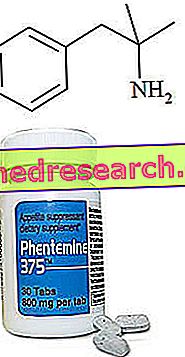What is Fentermine
Phentermine is a sympathomimetic drug with an anorectic action; it is therefore a medicine capable of enhancing the activity of the sympathetic nervous system, in particular thanks to the stimulatory effect on the release of noradrenaline and - to a lesser extent - of dopamine and serotonin. The consequent inhibition of the hunger center gives phentermine the aforementioned anorectic properties, which make it potentially useful in the treatment of obesity.

Side effects
Compared to amphetamines, the sympathomimetic and stimulating action of phentermine is significantly lower. Consequently, the extent of side effects such as tachycardia, nervousness, anxiety, tremors, sweating, hypertension, constipation, nausea, insomnia, headache and dry mouth are also modest. Prolonged use of phenylethylamine induces tolerance and can cause dependence.
Despite these important side effects, in some countries phentermine has been approved for use in the treatment of obesity (body mass index equal to / greater than 30 kg / m2) resistant to diet therapy and to the correction of behavioral habits.
Mode of use
The dosage involves the intake of 30-40 mg of phentermine hydrochloride per day in alternate months; it is advisable to avoid continued use and intake in the 4-6 hours preceding sleep.
While in the United States phentermine is an FDA approved drug, available under various trade names (Adipex-P, Qnexa, Obenix, Zantryl), upon presentation of a prescription, in Italy it is forbidden to manufacture, import or market preparations containing phentermine.
Phentermine and fenfluramine
Especially in the past, phentermine has been successfully associated with fenfluramine, another anorectic drug that increases the level of serotonin in nerve synapses. This is because the combination of the two drugs amplifies the anorectic effect, raises the mood and guarantees better control of the adverse effects of phentermine. This association of drugs, known as "fen-fen", was soon banned because it was responsible for several episodes of primary pulmonary hypertension and damage to the heart valves.
Warnings and Contraindications
Generally, the use of phentermine is recommended in the context of a broader therapeutic program, as a second-line treatment of obesity.
The use of this drug should be for short periods and in association with the practice of regular exercise supported by a controlled diet.
The use of phentermine may be contraindicated in the presence of hypertension, heart disease, atherosclerosis, thyroid dysfunction, diabetes, glaucoma or ocular hypertension. Consult a doctor before use.



